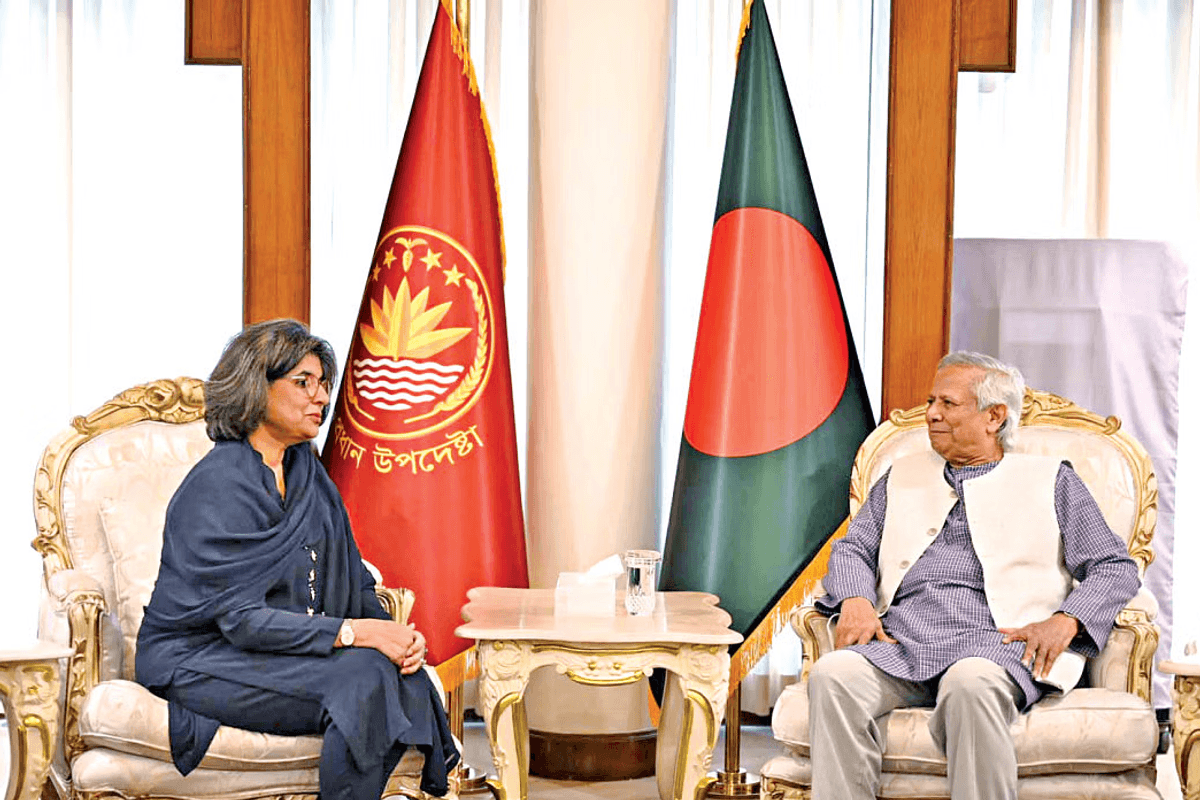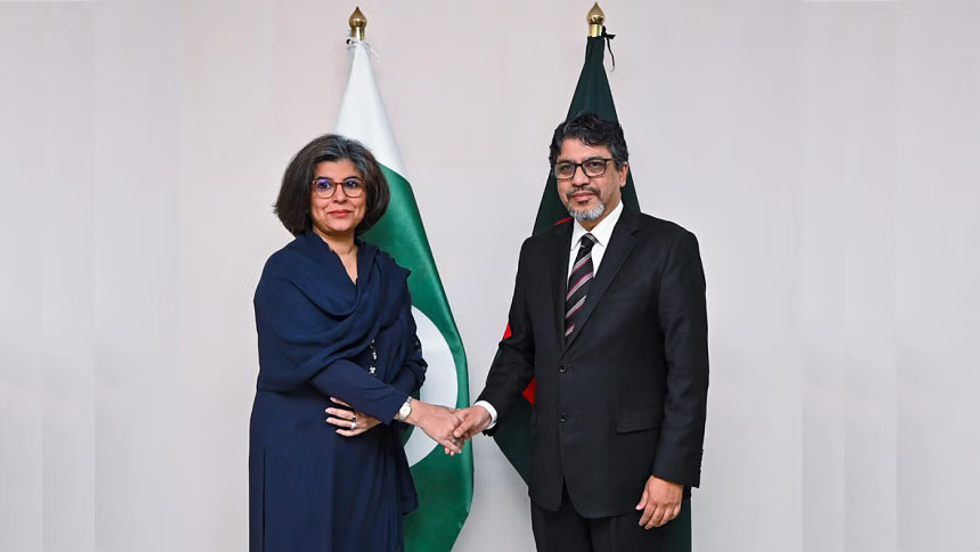Bangladesh seeks apology from Pakistan over 1971 war, urges resolution of ‘historical issues’
Pakistan’s Foreign Office says both sides discussed 'unresolved issues' while maintaining mutual respect
News Desk
The News Desk provides timely and factual coverage of national and international events, with an emphasis on accuracy and clarity.

Pakistan Foreign Secretary Amna Baloch called on Bangladesh’s Chief Adviser Professor Muhammad Yunus at the state guesthouse Jamuna in Dhaka on April 18, 2025.
Courtesy: Press Information Department Bangladesh
Bangladesh pressed Pakistan to apologize for the 1971 war atrocities and settle other long-pending issues as the two countries convened high-level diplomatic consultations for the first time in 15 years.
Foreign Secretary of Bangladesh Md. Jashim Uddin raised a series of “long-outstanding historic issues” during the Sixth Foreign Secretary Level Bilateral Consultation (FSLC), held in Dhaka on April 17, according to a statement from Bangladesh’s Ministry of Foreign Affairs.
“The Foreign Secretary of Bangladesh called for early resolution of historic outstanding issues to create the foundation of sound, solid and robust bilateral relations,” the statement said.
While Dhaka’s statement centered heavily on future cooperation and the need to resolve historical grievances, Pakistan’s Foreign Office emphasized shared culture, recent diplomatic progress and forward momentum.
Speaking during a weekly media briefing on Friday following the visit, Pakistan’s Foreign Office spokesperson acknowledged the sensitivity of certain subjects:
“Some outstanding issues were indeed discussed, however both sides stated their respective position in an environment of mutual understanding and respect,” the spokesperson said.
Bangladesh’s demands
- A formal apology for the 1971 genocide
- Repatriation of stranded Pakistanis
- Division of pre-1971 state assets
- Transfer of foreign aid meant for 1970 cyclone victims
- War reparations
The meeting, described as cordial by both sides, also covered economic, educational, and regional cooperation. Pakistan’s Foreign Secretary Amna Baloch, who led Islamabad’s delegation, paid courtesy calls on Bangladesh’s Foreign Affairs Adviser Md. Touhid Hossain and Chief Adviser Professor Muhammad Yunus.
Yunus' office said in a statement that he emphasized “strengthening ties with Pakistan to boost mutual cooperation and explore trade and business potentials.”
“There are certain hurdles. We have to find ways to overcome those and move forward,” he told Baloch during a meeting at the State Guest House Jamuna.
He said that Bangladesh and Pakistan should exchange more youth and cultural programs between the two countries to increase the people-to-people bonding. “We kept missing each other for a long time as our relationship was frozen. We have to overcome the barriers,” he said.
'Shared resolve drives renewed dialogue'
Islamabad’s Foreign Office said the dialogue was driven by “a shared resolve to revitalize bilateral engagement,” emphasizing common cultural ties and people-to-people exchanges.
The Pakistani delegation welcomed Bangladesh’s technical training offerings in fisheries and maritime studies, while offering placements for Bangladeshi students at Pakistani agricultural universities.
Both sides supported expanded cooperation in culture, sports, and media, with Pakistan praising recent performances by its artists in Dhaka. Several pending memoranda of understanding on cultural cooperation were discussed.
Pakistan noted with approval Bangladesh’s interest in revitalizing SAARC, adding that the organization should remain “insulated from bilateral political considerations.”
Expanding trade ties
Bangladesh’s foreign secretary expressed satisfaction over recent interactions between the two countries’ leaders at forums including the UN General Assembly and D-8 Summit. He also welcomed the upcoming visit of Pakistan’s Deputy Prime Minister and Foreign Minister, Senator Ishaq Dar.
But he stressed that without resolving fundamental historic issues, relations could not move toward a truly “robust” foundation.
The Bangladesh side also focused on expanding trade ties — particularly reversing the trade imbalance and increasing exports to Pakistan — and highlighted promising sectors such as jute, textiles, agriculture, and education. Dhaka reaffirmed its commitment to enhancing connectivity, including direct shipping between Karachi and Chattogram and the resumption of air links.
On global issues, Bangladesh condemned Israeli actions in Gaza, pushed for greater OIC coordination, and sought Pakistan’s support for the repatriation of Rohingya refugees to Myanmar.

Islamabad’s push for normalization
Pakistan has taken the lead in restarting bilateral engagement after a 15-year diplomatic freeze. Bangladesh, too, has shown openness to renewing ties -- particularly in areas like trade, defense cooperation, and broader regional collaboration. However, Dhaka made it clear that normalization of ties requires Islamabad to acknowledge and act on its wartime legacy. In contrast, Pakistan emphasized academic, cultural, and economic cooperation, while avoiding reference to the 1971 conflict.
Both sides acknowledged recent high-level interactions, including meetings between Bangladesh’s Chief Adviser and Pakistani Prime Minister Shehbaz Sharif on the sidelines of the D-8 Summit in Cairo in December 2024 and the UN General Assembly in New York in September last year.
A separate meeting was also held between Bangladesh’s foreign affairs adviser and Pakistan’s deputy prime minister during the Commonwealth Heads of Government Meeting in Apia, Samoa in October 2024.
Highs and lows of Pakistan-Bangladesh ties
The last foreign secretary-level talks between Pakistan and Bangladesh were held in 2010, during Prime Minister Sheikh Hasina’s first term. Since then, relations between the two nations have steadily deteriorated, largely due to unresolved tensions stemming from the 1971 war.
Ties hit a low point in 2013 when Pakistan condemned the execution of Jamaat-e-Islami leader Abdul Quader Molla, triggering a strong diplomatic protest from Dhaka. Similar incidents followed in 2014, further straining relations.
A brief attempt at rapprochement came in 2020 with a phone conversation between then prime ministers Imran Khan and Sheikh Hasina. However, little progress was made, as longstanding issues—including Bangladesh’s call for a formal apology, repatriation of pre-1971 assets, and the return of stranded Pakistanis -- remained unresolved.
A notable shift came in August 2024, when Pakistani Prime Minister Shehbaz Sharif congratulated Professor Muhammad Yunus on becoming head of Bangladesh’s caretaker government following the end of Sheikh Hasina’s tenure.
A month later, the two leaders met on the sidelines of the UN General Assembly in New York—an encounter that hinted at a possible thaw in relations.
Since Professor Yunus assumed office, diplomatic engagement between Dhaka and Islamabad has noticeably picked up. Both sides have expressed renewed interest in rebuilding ties through trade, dialogue, and cooperation.
In January 2025, military leaders from both countries met in Rawalpindi, agreeing to deepen defense cooperation and work jointly toward regional peace and stability.
During the visit, Bangladesh’s Principal Staff Officer Lt Gen S.M. Kamrul Hassan held meetings with Pakistan’s Chief of Army Staff Gen Asim Munir and Chairman of the Joint Chiefs of Staff Committee Gen Sahir Shamshad Mirza.
According to the Inter-Services Public Relations (ISPR), the Pakistani military's media wing, the discussions focused on evolving security dynamics and expanding avenues of military collaboration.







Comments
See what people are discussing